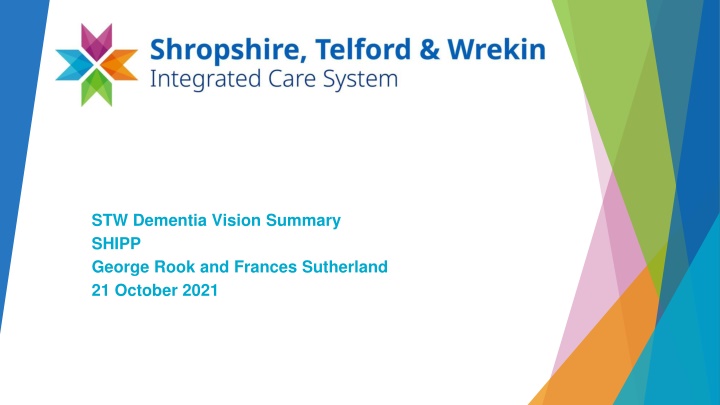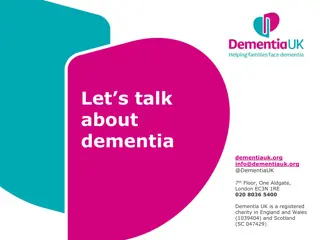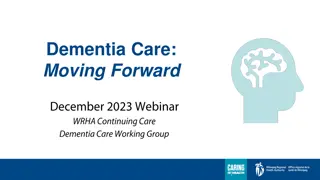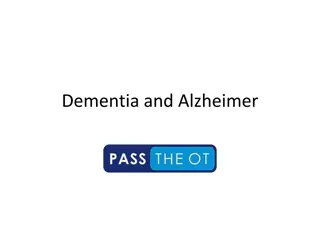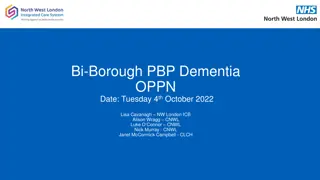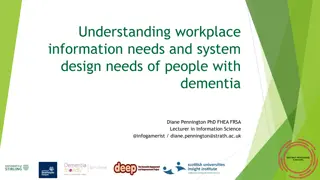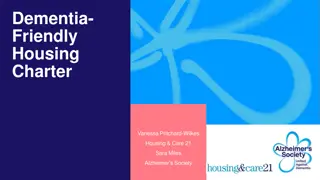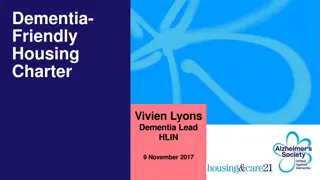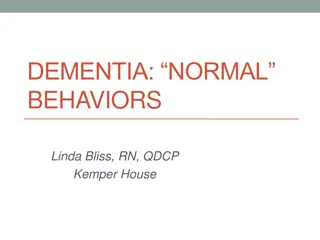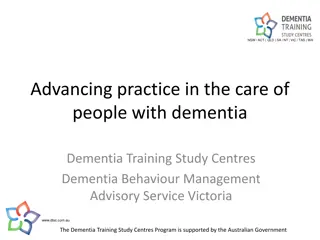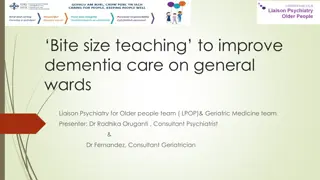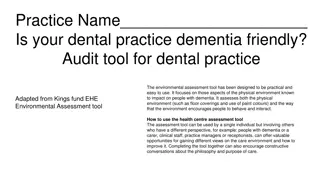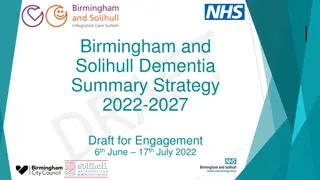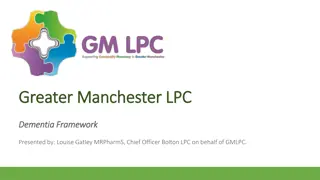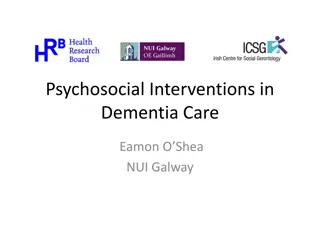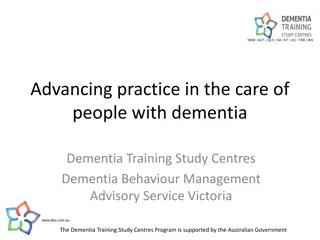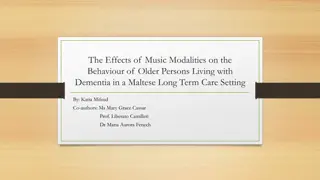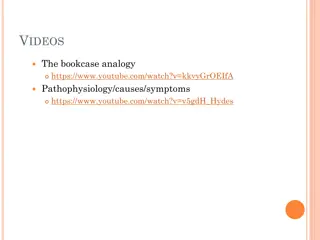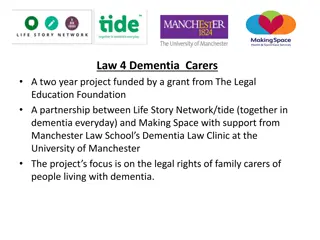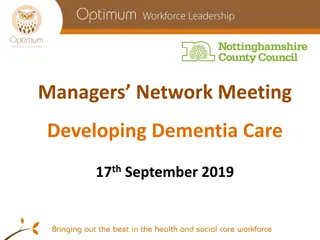STW Dementia Vision Summary: Enhancing Care for People Living with Dementia
The Dementia Vision Programme in Shropshire, Telford, and Wrekin aims to provide a person-centered and collaborative approach to support individuals with dementia and their caregivers. It focuses on co-production, collaboration, and improved services from diagnosis to palliative care. The vision emphasizes building dementia-friendly communities, enhancing peer support networks, and ensuring timely access to treatment and support. The program aims to offer a flexible range of services to meet the diverse needs of individuals affected by dementia.
Download Presentation

Please find below an Image/Link to download the presentation.
The content on the website is provided AS IS for your information and personal use only. It may not be sold, licensed, or shared on other websites without obtaining consent from the author.If you encounter any issues during the download, it is possible that the publisher has removed the file from their server.
You are allowed to download the files provided on this website for personal or commercial use, subject to the condition that they are used lawfully. All files are the property of their respective owners.
The content on the website is provided AS IS for your information and personal use only. It may not be sold, licensed, or shared on other websites without obtaining consent from the author.
E N D
Presentation Transcript
STW Dementia Vision Summary SHIPP George Rook and Frances Sutherland 21 October 2021
Dementia Vision The Shropshire, Telford and Wrekin dementia programme vision is important as it provides focus, sets direction and unites everybody with where we want to get to as a local health and care system. It also sets out what we want to achieve for and with people with living with dementia and their carers Key principles at every level What is the programme trying to achieve? Co-production People living with dementia and their unpaid carers are enabled to live the lives that they choose that enhances and preserves their wellbeing Collaboration- joint decision making Why the programme is trying to achieve this? We Need :- Person-centred- what matters to you? Support for carers as well as those with dementia from start of process A fully integrated seamless offer in place A system wide coordinated integrated living plan Continuity of care from diagnosis to palliative An effective community model A clear articulation of the offer Staff well trained to understand dementia Timely , easily accessible information How this vision will be achieved? Increase awareness and understanding across the STW Facilitate Dementia friendly communities Map present offer and find good model of practice Develop robust community offer which will include crisis response Equity of provision Build peer support network Develop effective information sharing system wide pathway for use of Living plans Develop Mild cognitive impairment support offer ( pre assessment) Value and respect Access to treatment and support when I need it Active listening What else can I support with? Robust early social /community support Joined up services across the system from GP to secondary care 5
STW Dementia Vision Summary Our Vision for STW is not so much a pathway as a box of services and support which people affected by dementia can dip into and use as and when they need them. There is no single route for the dementia journey; people can decline quickly or slowly, in steps or gradually, and people can improve for a time during the journey. So support and care services need to be agile and flexible to allow people affected by dementia to receive what they need, as and when they need it. There are just three certainties for all: assessment support when needed, and dying
STW Dementia Vision Summary 1. General Practice General Practices are the keystone in this model. We will have General Practices in which all staff understand the diseases that cause dementia, and the realities of living with dementia. General Practices will be Dementia Friendly and provide easy access for those with cognitive difficulties. 2. Assessment Following referral to the Assessment Service, assessment will be completed within 4 weeks. The diagnosis will be delivered face to face, in a relaxed, friendly setting, with plenty of time for reflection and discussion. There will be a place provided with tea and coffee where those receiving diagnosis can stop, take it in, and where they can discuss things with a person living with dementia who is suitably trained and willing. We wish to rename the assessment service, to remove the implication that dementia is just about memory. A new name has not been discussed in detail yet. 3
STW Dementia Vision Summary Continued 3. Dementia Navigator This will also be the opportunity to introduce those receiving diagnosis to the role of a Dementia Navigator, and, if possible, to the Navigator in person. Every person diagnosed will be offered and will meet a Dementia Navigator. This new role will be suitably trained person who takes on supporting those assigned to them. They will: provide local and national information at the right times that is appropriate to each individual; meet or speak to the person living with dementia (and their carer) regularly, or periodically, as the person with dementia wishes; accompany or support in other ways the person with dementia to access professionals, benefits, social activities, work, or whatever else is appropriate; liaise with other professionals in the dementia care system on behalf of the person living with dementia. 3
STW Dementia Vision Summary Continued 4. Admiral Nurses An Admiral Nurse service will be provided right across STW, and Admiral Nurses will work within PCN MDT teams. Admiral Nurses provide psychosocial and practical support for family or friend support groups when they are facing difficulties and/or nearing crisis point. They also work integrally with local MDT teams and GPs, and Dementia Navigators, to provide specialised knowledge and experience in dementia. 5. Peer Support Groups For many people living with dementia in early to middle stages, peer groups provide the ideal and possibly only support which they need. Therefore Peer Support Groups for People living with dementia and unpaid carers (separately) will be facilitated across STW. This facilitation will be purely to enable meetings to happen and inform people of meetings. Peer Groups will follow the DEEP model where people living with dementia (or carers separately) decide what they want to do, where they want to meet, now they wish to run their group, and everything else. Members of the groups will thereby provide the support and social interaction that almost all highly value. There will be peer groups in at least every market town or locality across STW. Funding will be found to support access transport for those (many in rural areas) who cannot otherwise attend. Facilitators will organise this. There may well be groups for different age ranges, i.e. young onset and later onset, but people can attend whichever group suits them. 3
STW Dementia Vision Summary Continued 6. Annual Dementia Reviews in general practice. Every person living with a diagnosis of dementia will have an annual review with one or more appropriately qualified/trained staff in their general practice. This will be a meaningful face to face discussion, the aim of which is to ensure that the person with dementia can live as meaningful a life as they can, to plan future care needs and advance care planning , and to develop a Living and Care Plan for the person, which will be given to, and owned by, the person with dementia. The annual review may be comprised of several meetings with different appropriate staff, of necessary. 7. Information and data sharing The STW Vision requires information sharing across the whole system in order to provide a joined up system for people. We commit to developing this. 3
STW Dementia Vision Summary Continued 8. A Crisis Team This team will provide crisis support in order to keep people at home whenever this is possible, including when that home is a Care or Nursing Home. The prime aim is to avoid moving the person either into hospital or some other care setting. 9. Care Homes Recognising that the support provided to residents in care homes is currently unsatisfactory, we will aim to provide the same levels of appropriate care and support whatever the setting in which a person lives. Work is needed to model what this would look like and how it would be provided. Whether or not a person with dementia pays for their own home or for a place in a care home, they are entitled to receive good, timely and appropriate support and care relating to their living with dementia. 3
STW Dementia Vision Summary Continued 10. Respite for unpaid carers and social care Family or friend carers (note that a third of people living with dementia live on their own) need timely and appropriate support in order to preserve their own health and wellbeing. Respite should be provided quickly when needed, and regularly throughout so that carers can have fixed and expected time off/away. We believe there should be an entitlement to 20 days (equivalent) of respite each year. Many will not need or use this in the early days, but it will become essential at some time later. 3
STW Dementia Vision Summary Continued 11. Carer Support Every person providing unpaid care for a person living with dementia should be registered as a care with their general practice. And every contact by GP clinical staff will include an enquiry about their caring role and their health related to that role. There are a number of important matters to decide, including: in which organisation staff are hosted how Primary Care Networks will organise MDTs to include Admiral Nurses and Dementia Navigators as and when appropriate training required for the Dementia Navigator role training required for first point of contact LA staff to ensure they have correct up to date knowledge training required for general practice staff to upskill re dementia requirements to be accredited as a Dementia Friendly General Practice 3
STW Dementia Vision Summary Continued 12. Evaluation and Measuring Success We have started work to produce evaluation methods, and these will focus on both quality and quantity. Self-reporting at the time of contacts will be key to quality. 3
